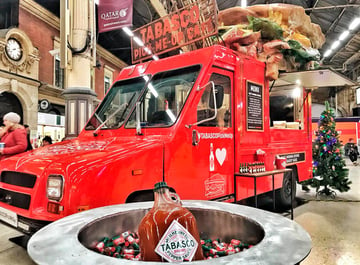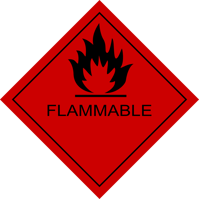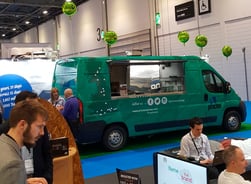Health and safety, health and safety, health and safety! Get used to hearing this a lot, because every promotional vehicle must comply with health and safety regulations, and every venue has them.
Just imagine multiple uniquely modified vehicles crowded together in an enclosed space… what could possibly go wrong!
In this article then we will cover the main health and safety requirements you are likely to encounter so you are able to confidently relay requirements to your promotional vehicle team.
Why do I need to understand my health and safety requirements?
Understanding Health and Safety requirements might sound a bit challenging, but you can see why it is important to be aware of how they work and what it is required from you - there is a lot that can go wrong if not handled correctly.
Health and safety checks will be carried out by your promotional vehicle supplier, but in order for that to happen you have to be able to tell us what they are, and that’s a lot easier when you know a bit about them yourself.
Failure to understand can lead to a failure to adequately communicate, which in turn can result in a non-compliant vehicle. This will require us to retrofit your vehicle last minute which can be extremely expensive, costing you as much as £2000.
It can also delay your start date, as you may be denied access to the venue, wasting all the money you paid for your premium spot.
Feeding correct health and safety information back to us means we can design a suitable setup from the beginning, allowing your activation to run smoothly from beginning to end.
What Kind of health and safety requirements do venues have?
Venues have a variety of health and safety concerns including RAMS, PAT, gas certificates, expiry dates, fire safety, power regulations and even parking stipulations. Let’s get into it.
RAMS
RAMS or Risk Assessment Method Statement, is one of the ways venues monitor health and safety standards. Venues will almost always ask for RAMS documents –documents that identify the steps taken to minimise hazards or risk when carrying out a task.
This is something we take care of for you, completing RAMS when and where necessary as part of our logistical services. However, we do need to know what regulations are in place in a venue so that we can comply with them in our RAMS documents.
Most venues will disclose documents detailing their requirements to you, which you can forward on to us as necessary.
PAT
PAT or Portable Appliance Testing, is carried out to ensure that all electrical equipment classified as “portable” is deemed safe for use. This is particularly important for catering or barista setups, which use multiple appliances.
Power
Power regulations vary venue to venue, so it’s always important to ask the same power questions for each one.
You need to understand what forms of power they allow, how much you can use, and if they only allow you to use their supply; how much they provide.
Generators might be allowed at one venue for example and then banned at another due to noise regulations. For the same reason gas might be banned at an indoor venue if it can’t be safely ventilated.
Generally you will be safe with greener forms of power such as lithium batteries and solar panels, but always ask, as it never hurts to cover all your bases. You could be asked to store batteries in a waterproof container filled with sand for example.
Fire
 Fire safety is universally important to venues, but again individual requirements will vary. All vehicle are generally required to carry a fire extinguisher suited to the kind of fire that may break out. For vehicles that is generally dry powder and foam extinguishers.
Fire safety is universally important to venues, but again individual requirements will vary. All vehicle are generally required to carry a fire extinguisher suited to the kind of fire that may break out. For vehicles that is generally dry powder and foam extinguishers.
Fire extinguishers should be in date and carry a service label, with a service certificate from a BAFE qualified individual/organisation available on demand.
Some venues may require a 0 fire rating, meaning in the event of a fire your vehicle and materials cannot combust in under 20 minutes. To minimise any risk of combustion, some venues will ask you to drain your fuel tanks after parking, and place down drip trays to catch any leaking fuel.
Gas
The use of gas may be restricted or banned in an indoor venue due to the risk of insufficient ventilation. Gas cookers will need a proper hood and extraction fan to ventilate a kitchen in many venues.
These rules will apply both in and outside a vehicle too, so you can’t just setup a griddle or a wok on a trestle table and start cooking.
Gas cannisters and appliances should have an adequate safety record that can be inspected if required. Cannisters must be stored in a ventilated box internally – with access only possible from the outside, or an external cage that will be naturally ventilated.
Parking
Even parking is often tightly regulated at venues, and you may be required to use a banksman. A banksman will oversee the process of moving a vehicle into its allotted position.
What are my next steps?
Now that you understand a little more about health and safety you will better understand what questions to ask your venue.
Accurately relaying all the information you receive back to your promotional vehicle team will help ensure a smooth campaign.
If your venue’s already sorted, then it’s time to pick the perfect vehicle. With over 20 different styles of vehicle, we have the widest range of promotional hires in the UK!
Available on a short or long-term basis, we’re confident that you’ll find the perfect promotional vehicle hire for your requirements.
If you’re not settled on a promotional vehicle companies, why not try our screening guide? We’ve compiled a list of 10 questions you can put to any promotional vehicle hire company to check for quality and professionalism.



